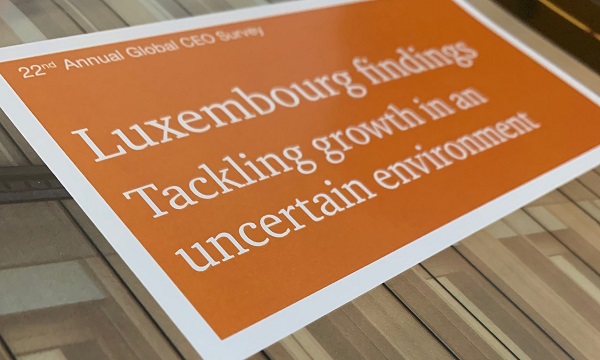
Over 80% of Luxembourg CEOs have indicated that either a deficit in supply of skilled workers or a change in the skills requirements in their industry has made hiring more difficult, according to the PwC's 22nd CEO Survey.
For the past 22 years, PwC Global has conducted a survey of CEOs around the world to collect their views about growth and understand the trends reshaping business and society. This is the second year PwC Luxembourg has participated.
Looking ahead to 2019, CEOs in Luxembourg were confident about their organisation’s revenue growth prospects over the short and medium term. They were also largely optimistic about local economic growth prospects. Despite this, many were cautious when considering the global state of the economy and were even pessimistic about Europe.
Luxembourg’s business leaders remained mindful of the challenges placed in front of them by the increasingly complex world in which we live. One of these challenges has arisen from Data and Artificial Intelligence (AI), where, despite progress, a significant gap remains in the information available to decision makers. A second challenge was where CEOs globally and locally confirmed they are confronted with a need for higher skills, but have an increasingly hard time finding that talent. This has resulted in a growing skills gap. The survey similarly showed that 34% of Luxembourg CEOs have considered investing in the skills of their staff as the main solution to deal with this lack of qualified workforce.
Nevertheless, over-regulation, availability of key skills and the speed of technological change remain at the top of Luxembourg CEO’s concerns. Among CEOs who expressed worry over trade conflicts, an overwhelming majority both in Luxembourg and around the globe considered the US-China trade conflict to be particularly concerning given the potential global consequences. This was followed by the trade conflict between the EU and the US. In light of these concerns, at a global level, 45% of CEOs are adjusting their supply and sourcing strategy while a quarter are looking to alternative territories for growth. Meanwhile, in contrast to this global trend, a staggering 54% of Luxembourg's CEOs plan to make no changes to their operating model and growth strategy.
Moreover, whilst over 80% of Luxembourg's CEOs believed that AI will significantly change the way they do business, when it comes to being able to support decision making, there is still a divide between what information business leaders want and how comprehensive they feel the data is. Luxembourg CEOs considered data about customers’ needs as most important, followed by financial forecasts, data about brand and reputation, business risks and employees’ needs. However, taking an average from of all these cases mentioned, just 29% of respondents viewed the data available to them as adequate. More than 40% of Luxembourg's CEOs attributed the information gap to a lack of analytical talent.
A majority of Luxembourg CEOs stated that the talent gap is increasing people costs, affecting the ability to innovate and impacting customer experience. As availability of key skills is a threat to growth, many businesses are having to reflect on how to attract, train and retain their workforce.








